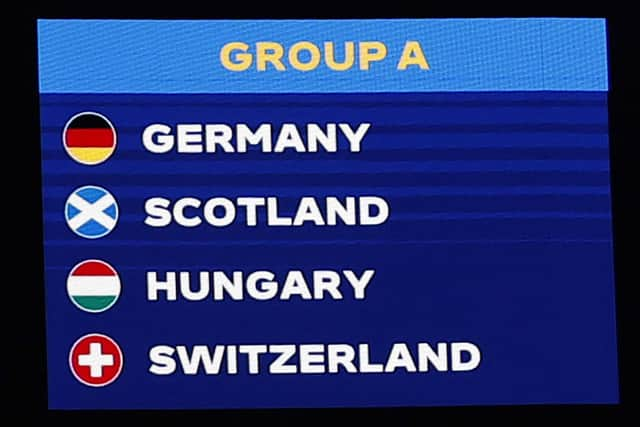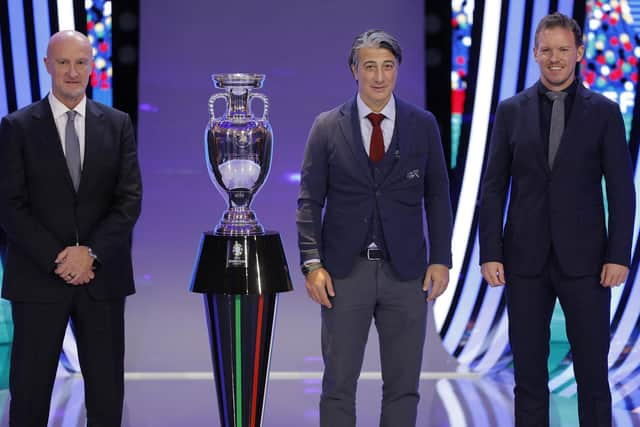Scotland's Euro 2024 opponents have say on draw - 'do you know anything about Steve Clarke? No'
Hamburg is known as a gateway to the world due to its port, which is the third largest in Europe.
An opportunity for Scotland to reach the second stage of a major finals has certainly opened up in the Hanseatic city, where Steve Clarke's side were drawn to play against hosts Germany, Hungary and Switzerland in next summer's Euro 2024 finals.
Advertisement
Hide AdAdvertisement
Hide AdA quickly constructed and eye-catching art installation next to the River Elbe ensures that the chance is plain for all to see. Over 70 port workers stacked shipping containers as the draw was being made to create the 12-metres high structure. Six towers – one for each group – featuring containers designed in the flags of the competing nations will remain on display at the O’Swaldkai terminal in Hamburg until 10 December.


A Saltire is the second top container in “Group A”. It would suit Clarke if this position was maintained following Scotland’s final game in Stuttgart against Hungary since that would guarantee qualification for the last 16.
Scotland must get back on to the winning trail by then. They will also need to defy expectations. The other three sides in their group have a higher Fifa ranking. As a Pot Three side, Scotland are projected to finish third.
That might be enough since the four best third-placed finishers also advance but knowing Scotland, and the history of heartache at major tournaments, they would be one of two third-placed teams to lose out. On goal difference probably. Or goals scored. Or most unsightly neck tattoos, or something.
Former German midfielder Michael Ballack has already branded the Scots the worst team in the group. Others have been slightly more generous although there has been a lot of damning with faint praise going on. 'We know what to expect from Scotland' was heard more than once during the post-draw interviews.


It was a case of if you can't say anything nice then don't say anything at all from Switzerland manager Murat Yakin, who is reported to be under pressure following a series of underwhelming results. Asked if he knew much about Scotland, he replied: “Not at the moment, no. We will start to look at them.” How about the Scotland manager then, Clarke? Know anything about him? “No."
Director of Football Pierluigi Tami was slightly more forthcoming. “Hungary and Switzerland and Scotland are all on a similar level behind Germany,” he said. “There is not very much between the three and it will depend on who performs best next summer.”
Tami felt confident his team would progress alongside Germany, either in first, second or third place. “I’m always positive about the national team because we have done so well in qualifying,” he said. “Qualifying from the section we are in is a challenge but that was always going to be the situation. We believe we can finish first or second, or, if necessary, third place in the group we’re in. But this is the third time in a row we have qualified for the Euro finals. In 2016 we got out of group and reached the round of 16. In 2020 we qualified from our group and reached the quarter-finals. We have shown we have the capability to make progress in competitions.”
Advertisement
Hide AdAdvertisement
Hide AdMarco Rossi, the bald-headed manager of Hungary, was the most expansive of the Group A managers post-draw, Clarke included. He grew up just outside Turin, later playing a handful of games in defence for Torino. He revealed he had been raised on stories of Denis Law, who played for the club for a season in the early 1960s, from his grandfather.
“He talked to me all of the time about the great Torino, the big Torino, when I was a boy growing up,” he said. “I obviously didn’t see him play because I had not been born when he was there in the 1960s. But my grandfather was a big supporter of Torino and he certainly told me all about Denis Law when I was young.
“He made a real impact in Torino, he did really well there,” he added. “The Torino fans who saw him play, like my grandfather, all remember him well. But British players, Scottish players, had clear characteristics and those clear characteristics were all especially appreciated at Torino, at the old Torino.
“Now it is a bit different, but in the past the typical characteristics of the Scottish players like Denis Law were admired. They were always running, always fighting, always having a great attitude. In Italy, and especially at a team like Torino, those qualities were very much appreciated.”
He seemed well-versed on modern Scottish players as well. Asked whether he had seen much of Lewis Ferguson in Italy, he said he had – and he was impressed by the Bologna midfielder.
“I have to say the Scottish players who are in the national team are all performing really well,” he added. “I have to say that. Over the top in fact. Many of them are not playing for the best teams. Yes, they have players who are playing in the Premier League, in the Championship or in Scotland with the likes of Celtic. But when they are together they are quite a tough team. In some respects, they are similar to us. We are a difficult team to face. When we are together it will be difficult for anyone to beat us, especially because together we are a strong team.”
He never came up against a Scottish team in a playing career that also included spells at Sampdoria and Eintracht Frankfurt. "I experienced playing against some English teams who had some Scottish players,” he said. “I am too old to remember who they were!"
Rossi is 60 next September, which means Clarke, who turned 60 in August, is the oldest of all the managers in Group A. Germany’s Julian Nagelsmann, just 36, is the youngest. Time will tell if experience proves telling.